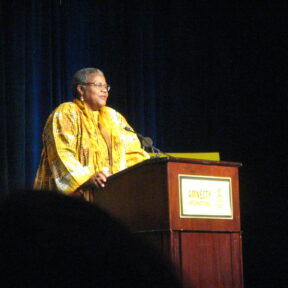
Bernice Johnson Reagon
: Photo from Creative Commons / Author of Photo: javacolleenOverview
* Singer, composer
* Former member of Student Nonviolent Coordinating Committee
* Curator emeritus at the Smithsonian Institution
* Condemns “the absolute dishonesty and lack of integrity that’s been revealed in the [capitalist] economic system”
* Says of the United States: “This is not the country that I want to help support and help build.”
Born on October 4, 1942, Bernice Johnson Reagon grew up in Albany, Georgia. In the 1960s she joined the Student Nonviolent Coordinating Committee (SNCC), wherein she organized the Freedom Singers, a group that used music as a tool of social protest. As a student at Albany State College in 1961, Johnson Reagon was arrested for participating in an SNCC demonstration. In 1966 she co-founded the Atlanta-based Harambee Singers.
Johnson Reagon earned a bachelor’s degree in history from Spelman College in 1970, and a doctorate in U.S. history from Howard University five years later. In 1973 she founded “Sweet Honey in the Rock,” an a cappella protest quintet that performed traditional African and African-American music. She remains active with the group to this day, composing and producing many of its songs. She also has composed music for several films, including We Shall Overcome.
From 1974 to 1993, Johnson Reagon served as the Smithsonian Institution’s folklorist, program director, and curator. In 1984 she helped develop the Peabody Award-winning radio program Wade in the Water: African American Sacred Music Traditions for the Smithsonian and National Public Radio. Since 1993, Johnson Reagon has been curator emeritus at the Smithsonian.
In 1995 Johnson Reagon was the commencement speaker at Williams College in Massachusetts. Three years later she was the score composer for the Peabody Award-winning film series Africans in America, aired by PBS.
From 1993 to 2002, Johnson Reagon was a history professor at American University. For the 2002-03 academic year, she held the title of William and Camille Cosby Endowed Professor in the Fine Arts at Spelman College.
Discussing what she terms her own “wholistic” approach to social and political issues such as the modern-day antiwar movement, Johnson Reagon says:
“To say ‘peace’ is to make it too narrow. There are people who are involved who are very disturbed over our invasion of Iraq; these same people are appalled at the absolute dishonesty and lack of integrity that’s been revealed in the [capitalist] economic system.”
An inveterate critic of the United States, Johnson Reagon says: “This is not the country that I want to help support and help build, and it is important for me to say it in some way.”
In 1999 Johnson Reagon attended the anti-globalization riots, led by Global Exchange and the Ruckus Society, in Seattle. She characterized the mayhem as “a very important effort.”
The National Organization for Women honored Johnson Reagon on September 9, 2004, at its “Second Annual Intrepid Awards Gala.” Also on the bill were Vagina Monologues playwright Eve Ensler and the socialist union-organizer Dolores Huerta.
Johnson Reagon received the 2003 Heinz Award for the Arts and Humanities, presented by the Heinz Family Foundation. She was also the recipient of the Leeway National Award for Women in the Arts (2000), the Presidential Medal for contribution to public understanding of the Humanities (1995), and a 1989 MacArthur Fellowship (presented by the John D. & Catherine T. MacArthur Foundation).
Portions of this profile are adapted from 57 Varieties of Radical Causes, authored by Ben Johnson and published by the Center for the Study of Popular Culture in September 2004.